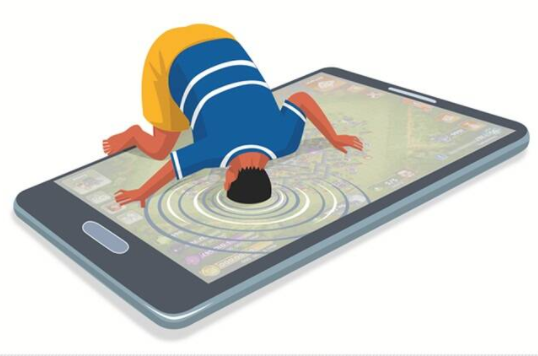Although an incredibly effective tool to be a smartphone, tablet, or computer, compulsive use of these gadgets can conflict with work, education, and relationships. It might be time to reconsider the use of technology whether you spend more time on social media or playing games like PubG than you communicate with actual people, or you can't stop yourself from reading messages, emails, or applications repeatedly, even if it has detrimental implications in your life.
Smartphone addiction is often fuelled by an Internet overuse epidemic or Internet addiction disease, often colloquially referred to as "nomophobia" (fear of going without a cell phone). After all, the addiction is rarely generated by the phone or tablet itself, but rather the sports, applications, and online realms that it binds us to.
It would not be incorrect to say that human beings have become technical slaves. In fact, we have grown addicted to our cell phones. Many individuals suffer from extreme smartphone addiction at present. It's like their life revolves around their phones, and without them, they can't do it for an hour. To live a safe, productive, and happy life, it's important to eradicate this addiction.
Causes of Mobile Phone addiction

Virtual relationships.
Social networking, dating applications, texting, and email addiction can extend to the point that fictional, online friends are more valuable than relationships in real life. We have all seen couples seated in a restaurant together avoiding each other and just playing on their smartphones. While the Internet can be a wonderful place for meeting new people, reconnecting with old friends, or even beginning intimate virtual relationships, online relationships are not a safe replacement for experiences in real life. As they seem to live in a bubble, online partnerships may be desirable, not subject to the same pressures or strains as chaotic, real-world relationships. Instead of building long-term relationships, compulsive use of dating apps will turn the attention to short-term hookups.
Overload of Information.
Compulsive web browsing, video streaming, playing sports, or monitoring news feeds can result in lower job or school morale and detach you for hours at a time. From real-world relationships to interests and social pursuits, compulsive use of the Internet and mobile applications will lead you to ignore other elements of your life.
Online Compulsions.
Online compulsions will also lead to financial and job-related difficulties, such as poker, gambling, stock trading, online shopping, or bidding on auction sites like eBay. Although gambling addiction has been a well-documented concern for years, gambling has become even more available with the availability of internet gambling. Trading in compulsive markets or buying online can be just as financially and socially detrimental. In order to be online for the last remaining minutes of an auction, eBay addicts can wake up at odd hours. Only to witness the thrill of putting the winning bid, you can buy items you don't need and can't afford.
Here are signs and symptoms of mobile phone addiction:

-
To have the same desired outcome, the mobile phone needs to be used more and more frequently.
-
Persistent efforts to use mobile phones less often have failed.
-
Fixation with using a smartphone.
-
When having uncomfortable emotions such as fear or sadness, it switches to the mobile phone.
-
Excessive usage with a lack of sense of time.
-
Owing to improper mobile phone use, he has put a friendship or career at risk.
-
And immunity.
-
Need for the newest smart devices, additional games, or expanded usage.
-
Withdrawal, where it is difficult to access a mobile phone or network.
-
Rage.
-
Tension.
-
Depression.
-
Irritability.
-
Restlessness.
Trouble completing jobs.
Will you see laundry piling up for dinner in the house and no food when you've been busy talking, texting, or playing video games online? Perhaps you find yourself too frequently running late and you can't finish your job on time.
Isolation from friends and relatives.
Is it because of all the time you spent on your phone or some laptop that your social life suffers? Can you lose track of what is being said while you are in a meeting or speaking with friends while you are searching for your phone? Have friends and relatives shared worry about your phone's amount of time you spend? Do you feel like nobody, except your family, knows you like your online peers in your everyday life?
Hiding the use of a smartphone.
Are you sneaking off to a safe spot to use your phone? Do you cover the use of smartphones or fib about the amount of time you spend online with your boss and family? When your online time is disrupted, do you get annoyed or cranky?
Getting a' fear of losing out' (or FOMO).
If you don't check your phone daily, do you hate feeling out of the loop or think you're losing out on important news or information? Do you continue to scan social media compulsively when you're worried about someone enjoying a great time, or living a more interesting life than you? Do you wake up and search for your phone at night? When you leave your mobile at home, the battery runs out or the operating device fails, you feel fear, nausea, or panic. Do you think your phone has vibrated, but when you check, there are no new texts or updates? Or do you sense ghost vibrations?
Here's how you can control mobile addiction

Recognize the causes that make you use your phone.
Is that when you're bored or lonely? For starters, if you are dealing with depression, tension, or anxiety, the excessive use of smartphones may be a way to soothe rocky moods. Find better and more productive ways to control the moods, such as using calming strategies, instead.
Understand the contrast between in-person and online contact.
Human beings are organisms that are relational. For human contact, we are not supposed to be alone or to depend on technology. Face-to-face physical interaction with another person, making eye contact, reacting to body language, will help you feel relaxed, comfortable, and heard, and put the brakes on stress quickly. Interacting with these nonverbal messages that text, email, or texting would not have the same impact on your emotional well-being. Besides, when a tragedy strikes, online buddies will not hug you, meet you when you're ill, or share a joyful moment with you.
Build up your coping ability.
Maybe your way of dealing with frustration or rage is tweeting, texting, or posting. Or maybe you have difficulty communicating with others and find it easier to chat with others online. Without depending on your smartphone, developing skills in these fields will help you deal with the pressures and strains of everyday life.
Recognize any underlying issues that might help your compulsive behavior.
Have you had alcohol or addiction issues in the past? Would something about the use of your mobile remind you of how you used to numb or distract yourself by drinking or using drugs?
Reinforce your network of support.
For friends and family, set aside devoted time each week. If you are shy, without relying on social media or the Internet, there are ways to conquer social awkwardness and make lifelong friends. Try reaching out to friends at college, joining a sports team or reading club, enrolling in an education program, or working for a good cause, to meet others with common interests. You will be able to engage with people like you, let relationships grow naturally, and form friendships that will enrich your life and improve your well-being.
Assisting a child or teenager with mobile addiction

Any adult who has attempted to pull an infant or adolescent away from a mobile or tablet understands how tough it can be to isolate children from social media, texting applications, or videos and games online. Youngsters lack the wisdom to curtail their own use of their mobile, but merely confiscating the gadget will also backfire, generating your child's fear and withdrawal symptoms. Instead, there are several other ways to help achieve a healthy balance for your child:
Be a positive role model.
Be a positive role model. Children have a powerful impulse to mimic, so controlling your own mobile and Internet use is crucial. It's not good to ask your kid to unplug when you're looking at your own phone or tablet at the dinner table. Do not let the use of your own smartphone detract from relationships between parents and children.
Use apps to monitor and restrict your child’s smartphone use.
A variety of applications are available that can limit the use of data by your child or restrict texting and web access at different hours of the day. When in motion, some software can disable texting features, so you can discourage your teen from using a mobile while traveling.
Develop "phone-free." areas
Limit the use of smartphones or tablets to a shared area of the house where you can keep an eye on the actions of your child and restrict online time. Ban phones from the dining table and bedrooms and insist that after a certain point in the night they are switched off.
Encourage other social events and desires.
By introducing your child to other interests and events, such as youth sports, scouting, and after-school clubs, get your child away from the computers. Spend time unplugged as a family.
Speak about the root concerns with your kids. Compulsive use of smartphones can be a symptom of deeper issues. Does your kid have trouble fitting in? Has there been a significant recent transition, such as a relocation or divorce, which creates stress? Is your kid struggling at school or at home with other problems?
Find assistance.
Teenagers frequently revolt against their parents, but they may be more likely to listen if they hear the same details from a particular source of authority. Try a sports coach, psychiatrist, or acquaintance with a respected family. If you are worried about your child's mobile use, don't be afraid to pursue licensed counseling.
Conclusion
Mobile addiction is increasing day by day. With the introduction of a new and more engaging app, people are spending more time on their mobile phones instead of focusing on their real life. People have become confused. Having made his mobile phone central to his life, he has created a new world for himself. It is tragic to see how mobile addiction is robbing people of their real life.
Also Read:
EASY TRACKING OF MOBILE SETS STOLEN OR LOST
5 BEST DIGITAL WALLETS IN NEPAL
WHY DOES ONE NEED LIFE INSURANCE?
TOP PHONES UNDER 50000 IN NEPAL 2020 (UPDATED) | SPECS
REALME C17 LAUNCHED IN NEPAL- PRICE, AND SPECIFICATIONS
SAMSUNG GALAXY S20, S20+ PRICE IN NEPAL, SPECS
Compiled by :

Upasana Poudel










